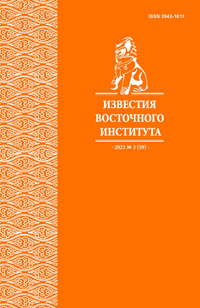Contemporary Theories on Korean Ethnogenesis: A Study of South and North Korean Scholars
DOI:
https://doi.org/10.24866/2542-1611/2023-3/14-22Keywords:
theories of ethnogenesis, Koreans, Republic of Korea, DPRK, autochthonous theory of ethnogenesis, migration theory of ethnogenesis, Juche theory of the nationAbstract
This study offers an examination of contemporary theories regarding the ethnogenesis of Koreans, presented by South and North Korean scholars. The author uses a methodological system that is widely accepted in the realm of historical science. This methodology maintains the integrity of the research by ensuring that the evaluation of the diverse range of information remains consistent, comprehensive, and unbiased. In conclusion, the author suggests that the predominant theory within South Korean historiography proposes a heterogeneous migratory theory for
the ethnogenesis of the Korean people. This theory posits that the Korean people were formed through a complex process involving migrations of various groups of people, spanning from the Bronze Age up until the establishment of the first united state. Conversely, in North Korean historiography, the ethnogenesis of Koreans is portrayed as an indigenous process. The belief here is that the Korean ethnic group developed autonomously and mostly within its current geographical boundaries.




